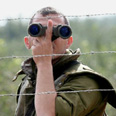
IDF soldier on Lebanon border
Photo: Reuters
The Winograd committee set up to investigate the military and political echelons' management of the war in Lebanon will start collecting testimonies on Thursday.
One of the first people to testify before the committee is former military intelligence chief maj.-gen. Amos Malcha, which will present an overview of intelligence since 2000.
Aftermath of War
Ahiya Raved
Prime minister tours military posts along northern border with defense minister, chief of staff Halutz; ‘Now we have a more responsible, mature IDF,’ he says
"Once you set a high standard which is unattainable, it is a problem," Malcha said about remarks by politicians and military officers during the war.
Speaking at a conference at the Interdisciplinary Center in Herzliya he said: "When the prime minister rejected Fouad Siniora's initiative, it was a serious mistake because that would have been the best way out for us. We need to reach a mechanism for taking decisions which allow strategy to be taken into account – and not only to respond. Armies usually don't recommend ending the war, they move forward and the political echelon needs to stop them."
Former chief of staff Amnon Lipkin-Shahar said at the conference that had former prime minister Yizhak Rabin been in charge, "The Lebanon war would have been managed in a totally different manner."
At the conference, which dealt with decision-making during the war, Shahak said: "The situation would have been similar even if the war had broken out one and a half years after the elections."
The Winograd committee would seek knowledge of the IDF's intelligence on Lebanon and Hizbullah on the eve of the May 2000 withdrawal from southern Lebanon and the intelligence collected over the last six years.
Roee Nahmias contributed to this report















